We will work until GM foods disappear!
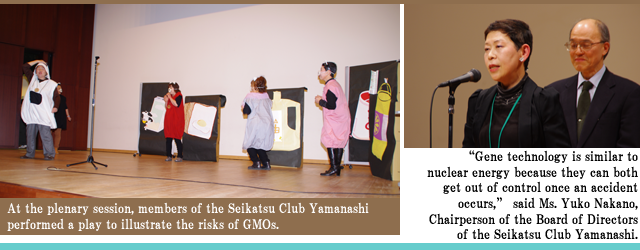
The GMO-Free Zone movement was originally launched in Italy to reject genetically modified organisms (GMOs). In 2005, rice farmers in Takashima City, Shiga Prefecture, declared themselves GMO free for the first time in Japan and the first nationwide GMO-Free Zones Conference was held in the same city. The 8th Conference was held in Hokuto City, Yamanashi Prefecture on March 2nd and 3rd this year, and a total of about 480 people attended the plenary and concurrent sessions. (Posted on April 15)
A series of findings show food safety risks
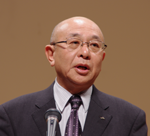 The conference was held under the theme of "GMO-Free Declaration from Yamanashi: Let's Protect Precious Food for Our Livelihood." Mr. Chiaki Horikawa, Chairperson of the Board of Directors of the JA Rihoku (local agricultural cooperative) made an opening comment as the chairperson of the planning committee for the conference. He expressed his concern over risks of the TPP negotiations regarding universal health care and food safety. "We want to keep our fruits and vegetables safe and secure. To this end, we include the clause ‘GM crops are not permitted’ in the agriculture promotion plan of JA Rihoku," said Mr. Horikawa.
The conference was held under the theme of "GMO-Free Declaration from Yamanashi: Let's Protect Precious Food for Our Livelihood." Mr. Chiaki Horikawa, Chairperson of the Board of Directors of the JA Rihoku (local agricultural cooperative) made an opening comment as the chairperson of the planning committee for the conference. He expressed his concern over risks of the TPP negotiations regarding universal health care and food safety. "We want to keep our fruits and vegetables safe and secure. To this end, we include the clause ‘GM crops are not permitted’ in the agriculture promotion plan of JA Rihoku," said Mr. Horikawa.
At the plenary session on the first day, Mr. Keisuke Amagasa, President of the NO! GMO Campaign gave the keynote speech, and Mr. Song Kiho, a lawyer from Korea, gave a special speech after speeches by Mr. Madaharu Shirakura, Mayor of Hokuto City, and Ms. Megumi Ishige, one of the leaders of the "GMO-Free Farmers in Hokuto City," which was a member of the planning committee.
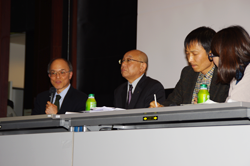 In 2012, according to Mr. Amagasa, GM crops were planted on 170.3 billion ha of farmland, equivalent to one tenth of the total farmland around the world. The number of countries producing GM crops had decreased from 29 to 28 since the previous year, after Cuba and Sudan joined the GM-producing countries, and Germany, Sweden, and Poland withdrew from GM crops.
In 2012, according to Mr. Amagasa, GM crops were planted on 170.3 billion ha of farmland, equivalent to one tenth of the total farmland around the world. The number of countries producing GM crops had decreased from 29 to 28 since the previous year, after Cuba and Sudan joined the GM-producing countries, and Germany, Sweden, and Poland withdrew from GM crops.
“GM salmon may soon be released onto the market and research and development is now being carried out on GM pigs,” said Mr. Amagasa, referring to a number of examples of GM food which show potential risks.
One was the fact that the American Academy of Environmental Medicine (AAEM) called for an immediate moratorium on genetically modified foods. “GM foods pose a serious health risk," said AAEM in its position paper. Citing several animal studies, the AAEM concluded, "There is more than a casual association between GM foods and adverse health effects," and "GM foods pose a serious health risk in the areas of toxicology, allergy and immune function, reproductive health, and metabolic, physiologic and genetic health."
Another example was the animal study conducted by researchers at Caen University in France, which was published in September 2012. The health effects of a Roundup-tolerant genetically modified maize, cultivated with or without Roundup, and the health effects of Roundup alone were studied for two years in rats. According to the study, female mortality was increased two to three times, mostly due to large mammary tumors and disabled pituitary. Males had liver congestions, necrosis, severe kidney nephropathies and large palpable tumors.
"If Japan joins TPP, we would be forced to accept more GM crops and foods due to a weakening of GMO safety assessments and the GM food labeling laws under the claim that these are trade barriers,” said Mr. Amagasa sounding an alarm about the recent announcement from the government that Japan will join the TPP negotiations later this year.
An experience to learn from: The U.S.-Korea FTA
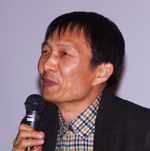 Mr. Song has written many books as a specialist in trade laws and the U.S.-Korea Free Trade Agreement (FTA). He made a speech entitled "Impacts of the U.S.-Korea FTA on Agriculture and the GM Issue." The U.S.-Korea FTA was enacted on March 15th, 2012. It stipulates that tariffs on 95% of all import items will be abolished in five years. Mr. Song explained the current situation by saying, "People are being impoverished by the FTA and are turning to criticize it."
Mr. Song has written many books as a specialist in trade laws and the U.S.-Korea Free Trade Agreement (FTA). He made a speech entitled "Impacts of the U.S.-Korea FTA on Agriculture and the GM Issue." The U.S.-Korea FTA was enacted on March 15th, 2012. It stipulates that tariffs on 95% of all import items will be abolished in five years. Mr. Song explained the current situation by saying, "People are being impoverished by the FTA and are turning to criticize it."
Mr. Song also pointed out that what is called the "GMO Memorandum" (Understanding on Agricultural Biotechnology), proposed by the U.S. government as a compromise in the FTA negotiations, has had a big impact on Korean GMO policies and organic farming. As a result of the compromise, the bill to strengthen the current GM labeling law was rejected. The bill was intended to introduce mandatory labeling of any food item derived from GMOs. The regulation on GMO safety assessments was also watered down.
"In the end, the memorandum aims at protecting GMO farming in the U.S. by fighting against a new international treaty such as the Cartagena Protocol on Biosafety,” he explained. “That is their national interest."
Under these circumstances, the Korean anti-GMO movement is lead by consumer cooperatives including the Hansalim Cooperative and iCOOP. Recently, the Korea Women Farmers' Association launched a movement to save indigenous seeds and drew people’s attention to the issue. Several organizations have formed a network to promote this movement.
"While the U.S.-Korea FTA brings pain and risks to Korean people, the anti-GMO movement, which is now promoted by organic farmers and consumers' cooperatives, is joining together with the anti-US-Korea FTA movement, which is driven by the general public,” said Mr. Song. “Japanese experiences will help the Korean movement, too," he concluded.
After the speeches, Mr. Horikawa, the chairperson of the planning committee, joined the two speakers to hold a panel discussion. “It is important to lobby politicians both at the local level and the national level,” said Mr. Song.
Active discussions at concurrent sessions
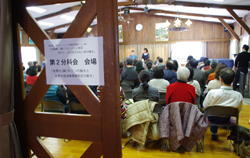 Three concurrent sessions were held on the second day. Mr. Kazuhiro Shrai, Executive Director of the Seikatsu Club Spirits Co., Ltd., acted as the advisor to the first session, whose theme was “Challenges of Farmers.”
Three concurrent sessions were held on the second day. Mr. Kazuhiro Shrai, Executive Director of the Seikatsu Club Spirits Co., Ltd., acted as the advisor to the first session, whose theme was “Challenges of Farmers.”
“It is becoming more and more difficult to buy non-GM seeds,” said Mr. Shirai explaining the current situation of GMOs. “A total of 28 GM varieties are grown in Japan for experimental purposes,” he added. At the first concurrent session, one farmer after another expressed their determination not to grow GM crops. For example, one dairy farmer who has been growing non-GM corn to feed his cows for 12 years talked about his experience.
At the second concurrent session, under the theme of "The Global GMO-Free Zone Movement and Local Ordinances," Ms. Michiyo Koketsu of the Consumers Union of Japan made a presentation on the GMO-Free Zone Movement, and Ms. Megumi Izumiya of the Seikatsu Club Hokkaido talked about local ordinances for regulating GM crop cultivation.
“While the number of countries which grow GM crops has not increased, more and more national and local governments and farmers' organizations are declaring themselves GMO free," pointed out Ms. Koketsu, emphasizing that "This was achieved through movements led by citizens and NGOs.”
Ms. Izumiya explained how they worked against a field trial of GM rice in her community. The movement eventually led to the Hokkaido ordinance to prevent GM contamination. "It is important to convince the local government to formulate and enact an ordinance even if it is not fully satisfactory,” said Ms. Izumiya based on her experience.
At the second concurrent session, the "Network of Mothers to Protect Foods in Yamanashi," launched by young mothers in the midst of child-raising, gave a presentation about their activities. Ms. Izumiya encouraged them by saying, "Young people in Hokkaido are also initiating unique activities that have never been seen before. We would love to work with them like you do in Yamanashi."
The theme of the third concurrent session was “Japanese Policies on GMOs.” “Japanese regulations on GMOs vary depending on which ministry has jurisdiction over the regulations,” said Mr. Amagasa, who acted as advisor to the session. He also pointed out that they have loopholes, because the Japanese government gives special consideration to the United States, the biggest food exporter to Japan. "We need to press the Consumers Affairs Agency, the Diet and politicians to reflect consumers' opinions in the new food labeling law, which is currently being discussed by the agency,” he said. “In order to regulate the international marketing of GMOs, we need to work with other NGOs at a global level in order to influence international treaties,” he added.
Farmers had a prominent presence in the conference. At the plenary session on the first day, Ms. Yuko Nakano, Chairperson of the Board of Directors of the Seikatsu Club Yamanashi said that gene technology is similar to nuclear energy because they can both get out of control once an accident occurs. “In order not to allow another Fukushima, I hope that this conference will work as a place for us to share our determination to continue to reject GM crops, and that we will work to spread our ideas to other places,” she concluded.
生活クラブをはじめませんか?
42万人が選ぶ安心食材の宅配生協です
ウェブ加入限定 無料プレゼント






